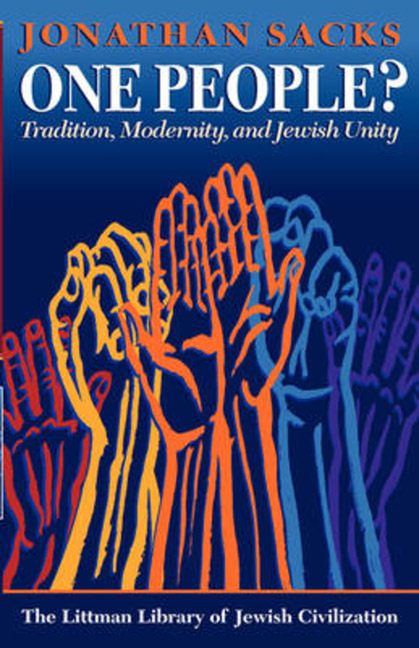Book contents
- Frontmatter
- Dedication
- Preface
- Contents
- Note on Transliteration and Place Names
- Abbreviations
- 1 The Crisis of Contemporary Jewish Thought
- 2 The Birth of the Adjectival Jew
- 3 Orthodoxy, History, and Culture
- 4 Orthodoxy and Jewish Peoplehood
- 5 Tradition and Diversity
- 6 Inclusivism
- 7 A Collision of Consciousness
- 8 Schism?
- 9 The Future of a People
- Bibliography
- Index
2 - The Birth of the Adjectival Jew
- Frontmatter
- Dedication
- Preface
- Contents
- Note on Transliteration and Place Names
- Abbreviations
- 1 The Crisis of Contemporary Jewish Thought
- 2 The Birth of the Adjectival Jew
- 3 Orthodoxy, History, and Culture
- 4 Orthodoxy and Jewish Peoplehood
- 5 Tradition and Diversity
- 6 Inclusivism
- 7 A Collision of Consciousness
- 8 Schism?
- 9 The Future of a People
- Bibliography
- Index
Summary
THE word ‘Jew’ testifies to conflict. Before there were Jews, there was Israel, the people chosen by God to be the bearer of his covenant. After the death of Solomon the people split in two, into a northern kingdom of ten tribes called Israel, and a southern kingdom called Judah, though it comprised the tribe of Benjamin as well. In the eighth century BCE the northern kingdom was conquered by the Assyrians and its population deported. Rapidly they merged with the surrounding peoples, losing their language, their distinctive faith, and their identity. They assimilated and disappeared from the pages of history, to be remembered as the lost ten tribes. Those who remained were yehudim, Judeans, or, as the word gradually evolved from Greek to Latin to English, Jews. The history of the word takes us inexorably back to the first great division in Israel's memory. It was not the last.
The idea of Jewish unity is not marginal to Jewish self-understanding. Its appearance in the early rabbinic literature is evidence of a long and disastrous series of internal conflicts which at times threatened the integrity and survival of the Jewish people. To take a single example: an early rabbinic commentary contains a remark that sheds light on the rabbis’ understanding of their people's past. The subject under discussion is the moment when the Israelites prepared to accept the Torah at Sinai, their constitution as a holy people. The biblical verse reads: ‘They departed from Refidim and arrived at the Sinai Desert and camped in the wilderness; and Israel camped there opposite the mountain’ (Exod. 19: 2). In the Hebrew, the first three verbs are in the plural, the last in the singular. The plural ‘they’ had become, momentarily, a single ‘Israel’. The rabbis, sensitive to the nuance and sensing that form mirrored content, understood this to mean that it was at this point that a fissiparous collection of individuals was fused into a single nation. Rashi cites the traditional comment thus: ‘And Israel camped there-as one person with one heart. But all their other encampments were marked by dissension and argument.’
- Type
- Chapter
- Information
- One People?Tradition, Modernity, and Jewish Unity, pp. 18 - 43Publisher: Liverpool University PressPrint publication year: 1993



